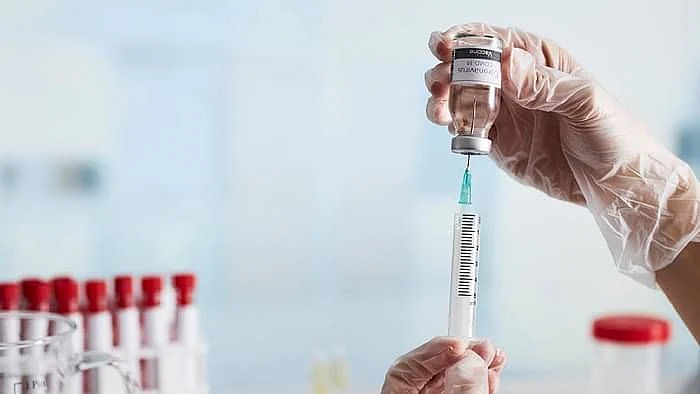
Who is Accountable for ‘Adverse Events’ in COVID Vaccine Trials?
What are the responsibilities of organisations like CDSCO, DCGI and ICMR?

advertisement
Recently, a volunteer in the Covishield vaccine trials in Chennai complained of a neurological breakdown and poor thinking abilities. He has sent a legal notice demanding compensation of Rs 5 crore from the Serum Institute (SII), the manufacturer of the vaccine. He also demands that they immediately stop all vaccine trials.
SII, however, has dismissed this complaint and instead counter-sued the volunteer, insisting that their vaccine was safe.
While this story plays out, some key questions are:
According to the National Regulatory Requirements for Clinical Trial in India (Regulatory Requirements for Clinical Trials in India), 3 institutions work for clinical trials and those are:
- Central Drugs Standard Control Organization (CDSCO)
- Drugs Controller General of India (DCGI)
- Indian Council of Medical Research (ICMR)
What Do These Organisations Do?
The Central Drugs Standard Control Organization (CDSCO) is the National Regulatory Authority of India.
Much like the United States has the Food and Drug Administration, or Europe has the European Medicine Agency, CDSCO is a branch of the Ministry of Health and Family Welfare and aims to monitor the safety, effectiveness and quality of medicines, cosmetics and medical devices and to protect and promote public health.
Meanwhile, the Drugs Controller General of India (DCGI) is an official body of CDSCO which is the final regulatory authority for the approval of clinical trials in the country. Its responsibilities also include inspection of trial, research and manufacturing sites, overseeing Central Drugs Testing Laboratory (Mumbai) and the Regional Drugs Testing Laboratories, as well as operating it as the head of the Indian Pharmacopoeia Commission. Apart from this, it has many more roles, responsibilities and work.
Finally, the Indian Council of Medical Research (ICMR) is the apex body responsible for formulation, coordination and promotion of biomedical research. It receives funding from the Ministry of Health and Family Welfare and the Department of Health Research, Government of India.
What Are the Rules For Clinical Trials in India?
Rule 80 (2) of the Drugs and Clinical Trial Rules 2019 states that clinical trials should be conducted before any new investigational drug, including vaccines, is manufactured.
According to a detailed article in The Wire Science , the role of the Ethics Committee is important to ensure that there is no disturbance in the clinical trial.
There are 2 types of Ethics Committee:
- One for clinical trials which approves or rejects a trial and
- One for biomedical and health research
The duties and responsibilities of this committee have been listed in the second schedule of rules. For example, the committee should ensure the safety and health of all the participants in the trial and periodically review the trial.
Ethics Committee should be registered with DCGI.
According to Rule 19 and 25, it is necessary for every clinical trial to have the following:
- Strict adherence to the permissibility and approval protocol from DCGI
- Ethics Committee approval (this committee should be already registered with DCGI)
- Get registered with the Clinical Trial Registry of India (CTRI) which is a free and online public records system for registration of clinical trials being conducted in India under the ICMR.
- Follow 'Good Clinical Practice' as per the guidelines of Central Drugs Standard Control Organization (CDSCO).
According to the Clinical Trial Rules, only the DCGI can initiate action when investigators fail to comply with the Drugs and Cosmetics Act or the Rules. And in such cases, the DCGI may – after giving a show-cause notice – issue a warning, reject the trial’s results, suspend or permanently cancel the permission granted and/or debar the investigator or sponsor from conducting any trials in future.
How are Serious Adverse Events (SAEs) Investigated During Clinical Trials?
The principal investigator of the site is required to report the Volunteer's SAE within 24 hours to DCGI, Sponsor and Ethics Committee.
- If unable to do so, the report must be submitted to DCGI giving reasons for the delay.
- The sponsor gives information to the Data Safety Monitoring Board.
- The Data Safety Monitoring Board prepares reports which go to the trial site, Ethics Committee and Regulators through sponsors.
- The Ethics Committee has to present its report on SAE, DCGI with its correct analysis and its opinion on compensation.
Additionally, if the doctors at the trial sites don’t adhere to ICMR’s research guidelines, they will be guilty of professional misconduct under Section 7.22 of the Indian Medical Council Regulations 2002. In such cases, the power to punish lies with the State Medical Council.
So it’s important to note that despite being a top body, the ICMR does not have the power to punish anyone directly because it is neither a statutory body nor a regulatory body.
What About the People? Who Looks After Volunteers
Now while these rules are there to protect the general public and the volunteers of clinical trials, Dr Gangandeep Kang a top vaccine scientist who was in the news for her contribution to India's rotavirus vaccine, says that the participant who becomes ill during the trials needs to be looked after first.
She explains that while all vaccines have some amount of risk, “no vaccine is licensed where benefits don't hugely outweigh any risk.” She wrote a tweet threat on how risks are measured and the safety process of vaccine trials here.
(The article was first published in FIT and has been republished with permission)
(At The Quint, we question everything. Play an active role in shaping our journalism by becoming a member today.)
- Access to all paywalled content on site
- Ad-free experience across The Quint
- Early previews of our Special Projects
Published: 01 Dec 2020,09:05 PM IST